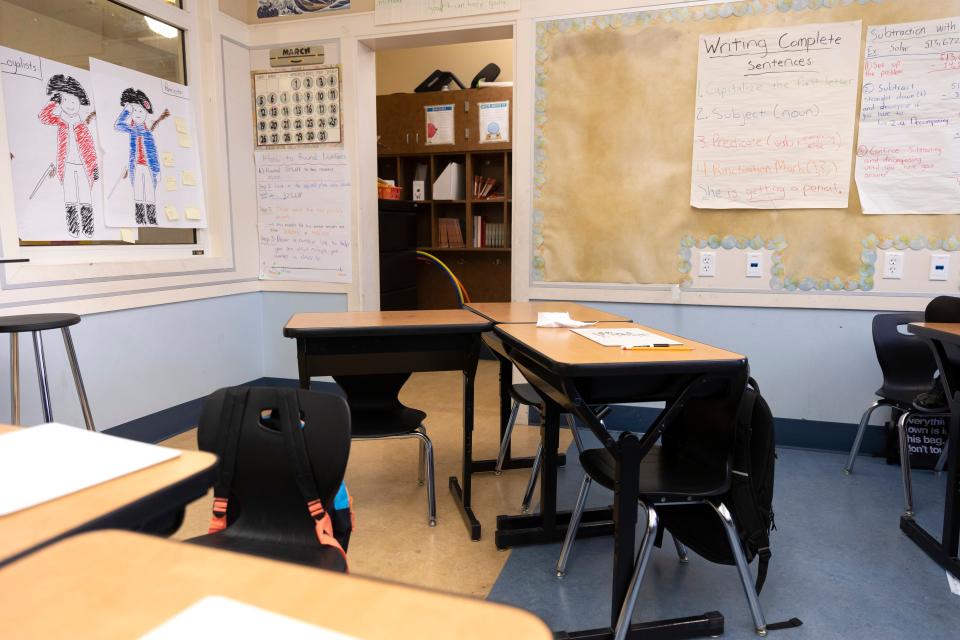America's kids are at risk. Here's what we must do to prepare them for uncertain future.
President Ronald Reagan strode to the White House podium on April 26, 1983, to frame the education reform agenda that would galvanize bipartisan support for the next 40 years. The commission report he released, "A Nation at Risk," asserted that higher standards, more standardized tests and tougher school accountability were needed to protect America’s economic and military security.
This simple construction successfully generated a sense of urgency around improving public education among leaders across the nation and on both sides of the political aisle.
Forty years later, however, we are even more a nation at risk, with waning commitment to democracy, unsustainable income inequality, and an epidemic of anxiety, depression and suicidal thoughts among adolescents.
Roundup of commencement addresses: 'My fellow Republicans wanted me to lie. ... Class of 2023, get out and vote'
Mental health: So you have a college graduate, now what? Why a plan forging forward is imperative.
For public education to play its part in redeeming the promise of America, we must preserve the strengths of education reform while recommitting to a broader vision of education that prepares young people for citizenship, work and living healthy lives.
The education reform movement that Reagan helped to launch four decades ago activated a powerful coalition, including business leaders who needed better-educated workers and civil rights leaders who saw higher expectations as a path to greater investments in disadvantaged communities. Southern governors from both parties were early adopters with an eye on economic development, rallying around standards-based reform to assert state leadership over the local control of public schools.
Education reform delivered better student achievement, but we need new approach now
The resulting reforms delivered important wins: Student achievement went up, especially in the early years and especially among the lowest-performing students, narrowing racial achievement gaps. High school graduation rates improved as better data brought new attention and investment. Perhaps most important, the focus on outcomes and the advent of disaggregated data to account for performance among different groups created infrastructure for improvement that we must never abandon.

What really stuck was the urgency to improve reading and math achievement and test-based accountability as the primary strategy. This laser-like focus drove resources to very real problems but, over time, the emphasis on test scores became the raison d’etre of education itself, displacing foundational purposes such as getting ready for citizenship and learning practical life skills.
This approach has not delivered on its own terms: test scores stagnated for a decade, even before the pandemic. Moreover, fundamentals such as social studies and science, not to mention art, were diminished to make room for longer reading and math blocks.
Jeb Bush: In this city, 93% of students are failing math
I'm a foster kid with a degree: That shouldn't be rare, but it is. We can change that.
Too much emphasis is placed on reading and math scores
That turned out to be counterproductive. More time on social studies and art increases reading scores and other positive outcomes, while science is fundamental to sustainability and many meaningful careers.
The education reforms that sprung from "A Nation at Risk"also privileged external, credentialed expertise and randomized control trials over the wisdom of experience and cultural responsiveness, ultimately alienating many schools from the communities they exist to serve. That increased disconnect has been especially acute in schools serving predominantly low-income students and students of color.
Opinion alerts: Get columns from your favorite columnists + expert analysis on top issues, delivered straight to your device through the USA TODAY app. Don't have the app? Download it for free from your app store.
We’ve learned a lot in recent years about how people learn and about the opportunities and experiences that contribute to success in work and in life. Students need to feel connected, challenged and supported at school. Social-emotional learning (SEL), fundamental to healthy human development, has been relegated to secondary status even though student surveys reporting their sense of social belonging and motivation to work hard at school are much better predictors of graduating high school and going to college than test score gains.
According to Populace, parents’ top priorities for school are developing practical life skills, sharpening critical thinking and problem solving, and ensuring students demonstrate character traits such as honesty, kindness and integrity.
These attributes are foundational to living a fulfilling life, succeeding in the future of work and being a good citizen. At this point, prioritizing standardized test scores as the most important measure of high-quality education ignores evidence that other measures are more important to parents and better predictors of long-term success.
Teaching history: As antisemitism rises, Holocaust education is a deeply personal topic for me
From a pediatric psychologist: Parents, stop trying to solve your kids’ problems. Their mental health depends on it.
Americans will confront existential risks in the years ahead: artificial intelligence and automation accelerating disruption in the labor market; misinformation and deep fakes coursing through social media and subverting truth; climate change that threatens our existence, just to name a few. Reading and math are, of course, important, but we can’t rely on test scores in these two subjects to orient the whole educational enterprise.
Continuing to wander through the desert of education reform will not deliver us to the promised land. We need a new agenda for public education that enables rising generations to redeem the promise of America.
Ross Wiener is executive director of the Education & Society Program and a vice president at the Aspen Institute.
You can read diverse opinions from our Board of Contributors and other writers on the Opinion front page, on Twitter @usatodayopinion and in our daily Opinion newsletter. To respond to a column, submit a comment to letters@usatoday.com.
This article originally appeared on USA TODAY: AI? Climate change? How to help our kids prepare for high-risk future

 Yahoo Sports
Yahoo Sports 